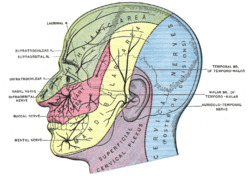Buccal nerve
| Buccal nerve | |
|---|---|
 Sensory areas of the head, showing the general distribution of the three divisions of the trigeminal nerve (buccal nerve labeled at center left) | |
 | |
| Details | |
| From | Mandibular nerve |
| Innervates | Lateral pterygoid muscle and cheek |
| Identifiers | |
| Latin | nervus buccalis |
| TA98 | A14.2.01.073 |
| TA2 | 6258 |
| FMA | 53066 |
| Anatomical terms of neuroanatomy | |
The buccal nerve (long buccal nerve) is a sensory nerve of the face arising from the mandibular nerve (CN V3) (which is itself a branch of the trigeminal nerve). It conveys sensory information from the skin of the cheek, and parts of the oral mucosa, periodontium, and gingiva.
Structure
[edit]Origin
[edit]The buccal nerve is a branch of the anterior division of the mandibular nerve (CN V3). It is the only sensory branch of the anterior division.[1]
Course and relations
[edit]After branching from the anterior trunk of the mandibular nerve (CN V3), the buccal nerve passes between the two heads of the lateral pterygoid muscle,[2][3] underneath the tendon of the temporalis muscle.[3] It then passes anterior to the ramus of the mandible to first course deep to the masseter muscle, and finally[2] anteroinferiorly[1] upon surface of the buccinator muscle[2][1] before piercing this muscle.[1]
Communications
[edit]It connects with the buccal branches of the facial nerve on the surface of the buccinator muscle. It gives off many significant branches.[4]
Distribution
[edit]The buccal nerve provides sensory innervation to the skin of the cheek, the buccal mucosa, buccal periodontium, and gingiva of mandibular/lower molar[2] and second premolar teeth (until the mental foramen). It also issues proprioceptive fibres into the buccinator muscle.[1]
Clinical significance
[edit]Anesthesia
[edit]Buccal nerve block (long buccal nerve block) is indicated for procedures involving the mucosa adjacent to the posterior molar teeth, such as the placement of a rubber dam clamp. The injection site is distal and buccal to the third molar, with the needle penetrating 1-2mm as the nerve lies directly below the mucosa.[5] A buccal nerve block is carried out after an inferior alveolar nerve block for specific procedures, such as extraction of mandibular molar teeth.
Surgical damage
[edit]The buccal nerve may be damaged by surgical incisions near the external oblique ridge of the mandible.[3][4]
Additional images
[edit]-
The nerves of the scalp, face, and side of neck.
-
Infaorbital and buccal nerve. Superficial dissection. Lateral view.
References
[edit]- "Nerve, buccal." Stedman's Medical Dictionary, 27th ed. (2000). ISBN 0-683-40007-X
- Gray's Anatomy: The Anatomical Basis of Clinical Practice. (2005). ISBN 0-443-07168-3
- Specific
- ^ a b c d e Sinnatamby, Chummy S. (2011). Last's Anatomy (12th ed.). pp. 364–365. ISBN 978-0-7295-3752-0.
- ^ a b c d Fehrenbach, Margaret J.; Herring, Susan W. (2017). Illustrated Anatomy of the Head and Neck (5th ed.). St. Louis: Elsevier. pp. 188–189. ISBN 978-0-323-39634-9.
- ^ a b c Hendy, C. W.; Robinson, P. P. (1994-12-01). "The sensory distribution of the buccal nerve". British Journal of Oral and Maxillofacial Surgery. 32 (6): 384–386. doi:10.1016/0266-4356(94)90030-2. ISSN 0266-4356. PMID 7848999.
- ^ a b Hendy, C. W; Smith, K. G; Robinson, P. P (1996-10-01). "Surgical anatomy of the buccal nerve". British Journal of Oral and Maxillofacial Surgery. 34 (5): 457–460. doi:10.1016/S0266-4356(96)90108-4. ISSN 0266-4356. PMID 8909743.
- ^ Malamed, Stanley (2012). Handbook of Local Anesthesia. Elsevier. p. 234. ISBN 9780323074131.
External links
[edit]- Anatomy figure: 27:03-03 at Human Anatomy Online, SUNY Downstate Medical Center
- MedEd at Loyola GrossAnatomy/h_n/cn/cn1/cnb3.htm
- lesson4 at The Anatomy Lesson by Wesley Norman (Georgetown University) (mandibularnerve)
- cranialnerves at The Anatomy Lesson by Wesley Norman (Georgetown University) (V)


